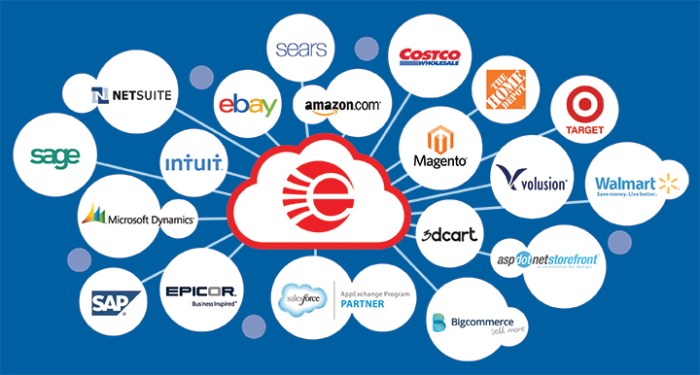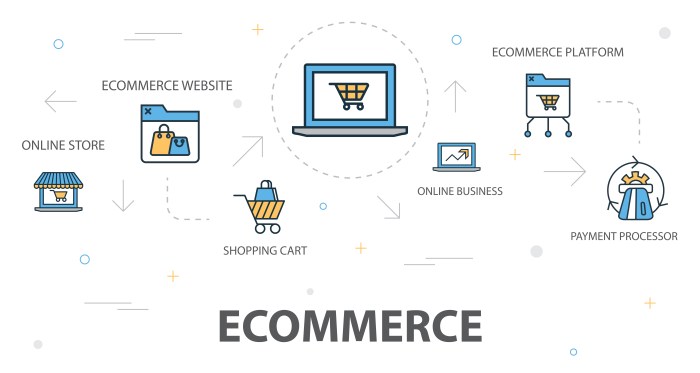E-commerce platforms have completely transformed the digital landscape, offering businesses endless opportunities to thrive and succeed in the online realm. From the evolution of these platforms to the key features that drive their success, this overview delves into the heart of e-commerce platforms.
Overview of e-commerce platforms
E-commerce platforms have revolutionized the way businesses operate in the online world. Let’s dive into the history, importance, key features, and evolution of these platforms.
Brief History of E-commerce Platforms
E-commerce platforms first emerged in the late 1990s with the rise of the internet. Companies like Amazon and eBay paved the way for online shopping, offering a convenient way for consumers to purchase goods and services from the comfort of their homes.
Importance of E-commerce Platforms for Online Businesses
E-commerce platforms play a crucial role in the success of online businesses by providing a digital storefront for companies to showcase and sell their products. These platforms enable businesses to reach a global audience, increase sales, and streamline the purchasing process for customers.
Key Features of E-commerce Platforms
- Secure payment gateways
- Mobile responsiveness
- Inventory management
- Customer relationship management (CRM)
- Integration with shipping carriers
Evolution of E-commerce Platforms over the Years
E-commerce platforms have evolved significantly since their inception, adapting to changing consumer behaviors and technological advancements. From simple online stores to sophisticated omnichannel platforms, e-commerce solutions continue to innovate to meet the demands of modern businesses and consumers.
Types of e-commerce platforms

E-commerce platforms come in various forms to cater to different business needs and preferences. Let’s explore the different types available in the market.
Hosted vs. Self-hosted E-commerce Platforms
When it comes to e-commerce platforms, one key decision businesses need to make is whether to opt for a hosted or self-hosted solution.
- Hosted E-commerce Platforms: These platforms are fully managed by a third-party provider and are usually subscription-based. Businesses using hosted platforms do not have to worry about server maintenance or software updates as it is taken care of by the provider. Examples include Shopify, BigCommerce, and Wix.
- Self-hosted E-commerce Platforms: Businesses that choose self-hosted platforms have more control over their online store. They are responsible for hosting the platform on their own servers and managing updates and maintenance. Popular self-hosted options include WooCommerce (WordPress plugin), Magento, and OpenCart.
Open-source vs. Proprietary E-commerce Platforms
Another distinction in e-commerce platforms lies in whether they are open-source or proprietary.
- Open-source E-commerce Platforms: Open-source platforms provide businesses with the freedom to customize and modify the source code according to their needs. This flexibility allows for greater control and scalability. Examples include WooCommerce, Magento (Community Edition), and PrestaShop.
- Proprietary E-commerce Platforms: Proprietary platforms are built and maintained by a specific company, and users typically have to pay licensing fees to use the software. While they may offer advanced features and support, they may lack the customization options of open-source platforms. Examples include Shopify, BigCommerce, and Squarespace.
Scalability of Cloud-based E-commerce Platforms
Cloud-based e-commerce platforms offer scalability, allowing businesses to easily adjust their resources based on demand.
Cloud-based platforms utilize remote servers to store data and run applications, offering flexibility and scalability without the need for physical infrastructure.
Benefits of Mobile E-commerce Platforms
With the increasing use of mobile devices for online shopping, having a mobile e-commerce platform has become essential for businesses.
- Mobile e-commerce platforms provide a seamless shopping experience for customers on smartphones and tablets, increasing accessibility and convenience.
- They often come with features optimized for mobile devices, such as responsive design, mobile payments, and push notifications, enhancing user experience and driving sales.
Popular e-commerce platforms
When it comes to e-commerce platforms, there are several popular options that cater to different needs and preferences. Let’s take a closer look at some of the key features and aspects of leading e-commerce platforms in the market.
Shopify
Shopify is a prominent e-commerce platform known for its user-friendly interface and extensive range of features. Some key highlights of Shopify include:
- Easy setup and customization options
- Secure payment gateways
- Responsive customer support
- Integration with various marketing tools
WooCommerce, E-commerce platforms
WooCommerce, a plugin for WordPress, offers great flexibility and customization options for online stores. Here are some key aspects of WooCommerce:
- Ability to create unique storefront designs
- Wide range of extensions for additional functionality
- Integration with various payment gateways
- Support for digital and physical products
BigCommerce
BigCommerce stands out for its user-friendliness, making it a suitable choice for beginners. Some features that make BigCommerce beginner-friendly include:
- Intuitive dashboard and interface
- Built-in marketing tools
- Responsive themes for mobile optimization
- Abandoned cart recovery feature
Magento
Magento offers a robust platform with extensive integrations and extensions for scalability. Here are some key aspects of Magento:
- Wide range of customization options
- Advanced capabilities
- Support for multiple languages and currencies
- Integration with various third-party applications
Factors to consider when choosing an e-commerce platform: E-commerce Platforms

When choosing an e-commerce platform, there are several key factors to take into consideration to ensure the success of your online business. From capabilities to responsive design, each aspect plays a crucial role in the overall performance of your e-commerce website.
Importance of capabilities in an e-commerce platform
capabilities are essential for any e-commerce platform as they directly impact the visibility of your online store in search engine results. A platform that offers robust features, such as customizable URLs, meta tags, and sitemaps, can help improve your website’s ranking and attract more organic traffic.
Significance of responsive design for e-commerce websites
Responsive design is crucial for e-commerce websites as it ensures a seamless user experience across different devices, including desktops, tablets, and smartphones. A mobile-friendly design not only enhances user engagement but also contributes to higher conversion rates and improved search engine rankings.
Tips for optimizing product listings on e-commerce platforms
1. Use high-quality images: Visuals play a significant role in online shopping, so make sure to use clear and appealing product images.
2. Write detailed product descriptions: Provide comprehensive information about your products, including features, specifications, and benefits.
3. Optimize product titles and tags: Use relevant s in your product titles and tags to improve searchability and visibility.
4. Implement customer reviews: Encourage customers to leave reviews and ratings to build trust and credibility for your products.
5. Offer personalized recommendations: Use data analytics to suggest relevant products to customers based on their browsing and purchase history.





